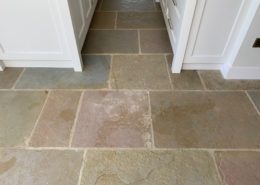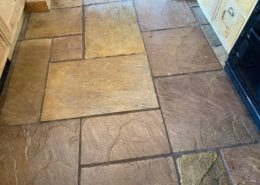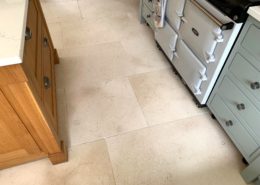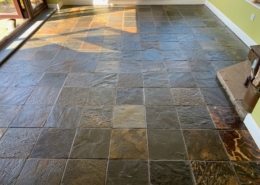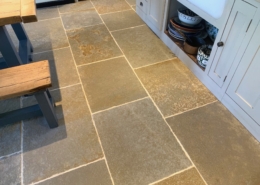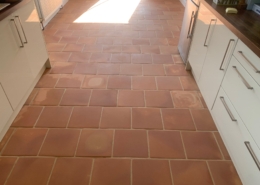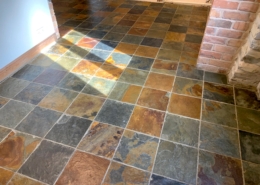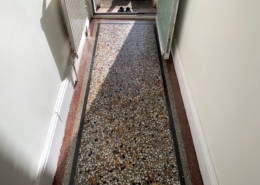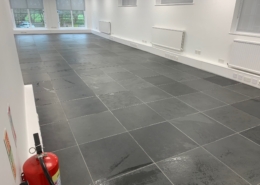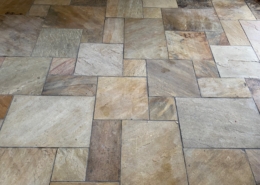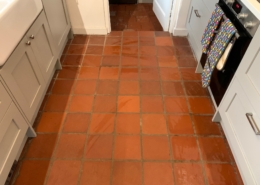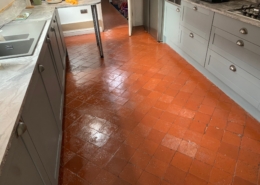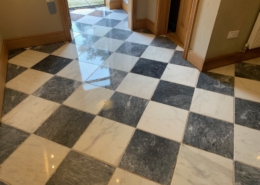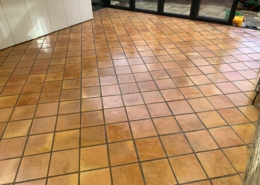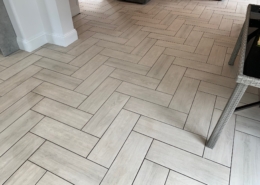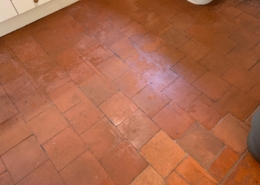Limestone floors
Limestone is a beautiful naturally occurring stone which makes for some stunning interiors. Maintaining limestone can be a challenge, since it’s soft and porous. If you think you might need some help restoring your limestone floor why not have a chat with Tile & Stone Medic and ask about our limestone cleaning and restoration service in Warwickshire? With years of experience you can feel confident we will be able to help.
Common issues
The soft surface of limestone can mean surface wear shows more easily than on alternative floor types. One complaint is that its surface can suffer erosion from heavy footfall. If the top of the stone was once smooth and has become pitted or worn then it may need restoration. Since limestone is particularly sensitive to acidic liquids such as fruit juice, spillages are often the culprit.
Occasionally we see limestone floors that have been damaged due to the wrong cleaning chemical being used. Due to its chemical sensitivity and a wealth of misinformation on the internet it’s easy to pick up a product that will actually do more harm than good to the sensitive rock. Staining from the use of such products is not usual.
Even if the right products have been used, their protective seal can quickly wear away if they are not professionally applied. If you’ve noticed dulling on the surface of your limestone floor this could be the case. Worn or exhausted sealant also means dirt and dust may cling to the surface of the limestone more than usual, making it near impossible to keep clean. That’s where our limestone cleaning and restoration service in Warwickshire comes in!
How we maintain limestone flooring
With years of experience delivering our limestone cleaning and restoration service in Warwickshire under our belts, we are confident we have the specialist knowledge needed to maintain and restore all types of limestone floor. Where pitting and marks have occurred on the surface of the stone we gently buff it using specialist equipment until the marks fade. We work carefully so as to avoid excessive wear to the soft rock.
Similarly, the chemicals that we use are tried and tested, chosen specifically because they will not damage the sensitive surface of the limestone floor. We have a range of solutions based on the level of wear present, but all will be entirely safe for use on limestone.
We always recommend a sealer for limestone, it’s essential to preserve the finish once it has been fully cleaned. Like all the specialist cleaning chemicals we use, the sealer is carefully selected and applied in order to ensure the longest-lasting and best looking finish.
Will repairing my limestone floor cause disruption?
While limestone floor requires a bit of maintenance to keep it looking its best, that doesn’t mean we’ll drag loads of heavy, noisy machinery through your home or workplace. All our limestone cleaning and restoration services in Warwickshire are carried out as considerately as possible, with an absolute minimum of disruption to your environment. The chemicals we use to restore the limestone flooring may be specialist, but they will always be absolutely safe for home use. You can rest assured we apply the highest standards of health and safety.
If you’re concerned that your limestone floor is in need of some serious care and attention, book Tile & Stone Medic’s limestone cleaning and restoration service in Warwickshire. You’re in safe hands.
FAQs: Limestone Cleaning
The process we carry out will depend on your specific floor and the use that it gets. There will be variations for different materials and the finish that you wish to achieve. The process will also be impacted by the full scale of work that we carry out, for example which types of cleaning and restoration are being performed. It is not unusual to apply several layers of sealant if this is necessary and appropriate.
Firstly, a floor should always be sealed when it is first laid. Get in touch with us straight away if this hasn’t been carried out already. It will also need periodic sealing in order to protect the floor on an ongoing basis. How often sealing is required depends on a number of factors such as the specific material used for your flooring and the kind of use it has to survive. For example, a bathroom with natural tiles that is frequently exposed to water may require sealing more often than porcelain tiles in a kitchen. Frequent maintenance, such as sweeping and hoovering up the dust and grit that erodes floors when trodden on can help. Once the sealant is worn away, not only will scratches be more likely, the risk of staining or permanent damage from liquids is drastically increased as there is no protective layer to prevent absorption. If in doubt get in touch with our team of friendly technicians who can discuss your needs.
We have a range of high quality Faber products which will help protect your floors from damage. As every type of floor is different and has myriad uses, we will consult with you to work out the best way to protect your investment. We can apply topical sealants which form a protective layer on top of the floor, or if needed an impregnating sealant, which will be partially absorbed into the stone or tiles. There are many variations of these sealants and as each floor type has unique characteristics and vulnerabilities we can work with you to find and apply the the best kind of protection.
Absolutely. If this was not carried out by those who fitted the floor get in touch immediately to ensure that the appropriate protection can be applied as promptly as possible. We would recommend that this is carried out once the flooring is in place as this means the grout, which is generally more porous, will also be protected.
We apply a sealer to a floor in order to protect it. Different types of floor, both manmade and natural stone, are vulnerable to different sorts of damage. They can all be harmed by chemicals to a certain degree, even by the acid in food and drink spillages, as they will be very slightly porous. As well as this, they can be worn away by physical damage. Even foot traffic can have a big impact if dust or grit has built up on the floor, since it increases abrasions. A sealant will reduce the chance of a spill becoming a stain by reducing the floor’s ability to absorb liquids. It can also help protect the appearance of the floor by forming a protective barrier. A sealant won’t prevent all damage and it will still wear away over time, but it will help your floors last longer, helping protect your investment. Sealants will even help protect your floor from UV radiation which can lead to fading over the lifespan of a high value stone or tiled floor. We can consult with you to find the best sealant for your floor and the type of use it gets to make sure it receives the best form of protection.
We are happy offer advice on best practice to look after your flooring, but it depends on the type of floor you have. Once we’ve had a look at it we’ll be able to help.
Yes, we have a range of fillers we can use to repair chipped or dented stone. Please note we can only carry out floor repairs as part of a full deep clean or restoration for your stone floor. Unfortunately, we are not able to attend to carry out repairs in isolation.
Usually we are able to stabilise stone flooring where it has become loose. We can repair grouting and make spot repairs to the subfloor where necessary. However please note, we do not offer a re-grouting service and we can only carry out floor repairs as part of a full deep clean or restoration for your stone floor. Unfortunately, we are not able to attend to carry out repairs in isolation.
Almost certainly. Send us a picture or a description and we’ll identify your stone. We always assess a surface before work starts in order to pick the most appropriate solution.
Whilst we may use specialist chemicals in the course of our work, we can assure you that by the time we leave all residues will be gone and your tile or stone flooring will be perfectly safe for everyone to use. We work to extremely high standards of health and safety, conducting proper risk assessments where appropriate and never putting you or anyone else in danger.
We always work in the most considerate way possible. Work will be tailored to your needs and will fit around your schedule where possible. We avoid bringing loud or bulky machinery into your home and when a job is complete we thoroughly clean up after ourselves to leave your space looking as tidy as it did when we arrived.



